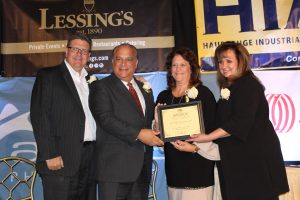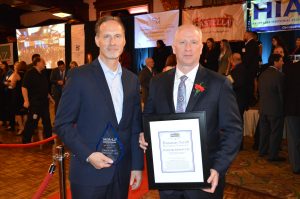
“The information HIA-LI has uncovered – including that the Hauppauge Industrial Park is the second largest in the nation behind only Silicon Valley and that one in 20 jobs on Long Island depends on it – is staggering. But while information is great, it means nothing if action doesn’t follow. So let’s talk about the work we’ve done over the past year.” CMM Managing Partner and HIA-LI Board Chairman Joe Campolo inspired the 500 business leaders gathered to celebrate their love for Long Island at the HIA-LI 24th Annual Business Achievement Awards on September 20 as he spoke of the projects and partnerships that he, HIA-LI President Terri Alessi-Miceli, and the Board of Directors have forged over the past year to grow this economic engine. Read the full text of Joe’s speech below.
Good afternoon, everyone. As mentioned, I proudly serve as the Managing Partner of CMM, and just as proudly I serve as the Chairman of the Board of Directors of the HIA-LI.
Thank you for joining us today at the Business Achievement Awards – we’re all gathered here to celebrate our love of Long Island and our desire to see it prosper and grow. CMM is a past recipient of the Rookie of the Year Award, and I remember sitting with my partners in the audience and finding out that we had been selected, and to this day it remains a pinnacle moment for us and our firm. So to all the finalists and recipients, I congratulate you and your teams on a truly wonderful accomplishment.
I like to think that my remarks last year marked the “coming out” of the economic importance of the Hauppauge Industrial Park to Long Island. We had just concluded a year-and-a-half long research project with graduate students from Stony Brook University to measure the economic impact of the Park on the region, and the results of this Economic Impact Study shocked even us at HIA-LI. Just a reminder of a few of those results I shared with you last year:
- The HIP is comprised of 11 square miles located primarily within the Town of Smithtown, with a small piece in the Town of Islip.
- It’s the second largest industrial park in the nation, behind only Silicon Valley! (Pretty amazing when you think about all the notoriety Silicon Valley gets, and how little the HIP has gotten.)
- Contained within these 11 square miles are approximately 1,400 companies that employ about 55,000 people. In fact, one in 20 jobs on Long Island is dependent on the HIP.
- The total sales volume of these businesses is in excess of $13 billion.
- The total annual payroll to HIP employees is in excess of $2.8 billion.
- The total income tax paid on that payroll is $806 million.
- This leaves in excess of $2 billion of household income to spend locally.
- The HIP generates more that $64 million in local property taxes.
But while information is great – and this information is truly staggering – it means nothing if action doesn’t follow. So let’s talk about all the work we’ve done at the HIA-LI over the past year since we uncovered this valuable information.
As a direct result of the Economic Impact Study, the Suffolk County IDA and the Regional Plan Association (RPA) have graciously granted critical funds to bring engineering, architecture, planning, and design professionals into the Park to help make it more viable for the future. We have been working closely with James Lima Planning and Development, as well as stakeholders in the Park, on ways to maximize the Park’s growth and competitiveness. These efforts are making national headlines as we continue to aggressively get the word out.
The Economic Impact Study also coincided with new leadership in the Town of Smithtown. Supervisor Ed Wehrheim and his administration, including Councilman Tom Lohmann, who in addition to the Town of Islip Supervisor Angie Carpenter, have since been incredibly receptive and supportive of our efforts to pass and explore new zoning regulations for the Park to allow businesses to grow. Our teams have been meeting regularly, with the Town of Smithtown giving us a direct seat at the table to discuss the needs of the park and most importantly giving us a line item in their capital budget.

Next, we’ve sharpened our focus on attracting and retaining talent here in the HIP and on Long Island in general. You may have heard that by 2025 – only a few short years away – over 70% of the workforce will be millennials. If we don’t keep these millennials working here in our businesses, factories, restaurants, and nonprofits, the Long Island economy can’t survive. As a result of the research we conducted, we learned that a huge factor in Silicon Valley’s success is its partnership with Stanford University, which provides a consistent stream of talent to the Valley. At that point, a lightbulb went off, and we realized that we need to be directly collaborating with our great universities and colleges. And so we have created a unique partnership between HIA-LI, as steward of the HIP, and Stony Brook University (Yacov Shamash and board member Ann-Marie Scheidt) and Suffolk County Community College (John Galiotos and Fara Afshar), with a laser-focused mission to find recent grads jobs right here in the Park. I also asked my fellow board member Sue Gubing, a career educator, to take on (and she graciously accepted) the role of the liaison with the career placement offices at these institutions so that we can directly help companies in the Park find talent and even hand-pick students and alumni when they have hiring needs, without getting lost in the bureaucratic shuffle.
Through these direct relationships, as well as our initiatives to create targeted job fairs exclusively for companies located in the Park, HIA-LI is ensuring that these businesses can attract and retain the talent needed to compete with the Googles and the Facebooks of Silicon Valley, which try every day to lure our most talented folks away.
Another critical initiative we are undertaking, understanding the “chicken and egg” relationship between jobs and housing, is that we are actively collaborating with LIBI, Tritec, and other real estate professionals to do feasibility studies and identify the zoning changes needed to create new residential developments with direct access to the Park, to house this growing workforce. These new partnerships have already gained tremendous momentum, and we’re just getting started!
But the Economic Impact Study and its impact aren’t the only things going on at HIA-LI. My amazing fellow board members are undertaking other important initiatives focused on economic growth and sustainability.
Our new energy initiative, headed by board member Scott Maskin, who is assisted with the guidance of Jack Kulka, aims to help building owners in the Park prosper by investing in renewable energy. They have worked closely with Mike Voltz (another board member) of PSEG to help identify 20,000,000 square feet of rooftops in the Industrial Park which can house solar, which would enable the businesses in the Park to lower their energy bills and become more competitive. Another home-grown initiative came from fellow board members Rita DeStefano, Joseph Garofalo, and Allan Lippolis, who have teamed up to create a small business task force, which hosts Town Hall meetings to focus on the needs and critical role of the often-forgotten sector of small business.
All of this demonstrates that the Hauppauge Industrial Park is more than just a random collection of buildings. It’s a living, breathing business ecosystem and the HIA-LI takes its role as steward of the Park very seriously. I am privileged and honored to work with HIA-LI President Terri Alessi-Miceli and her talented staff to help keep all of these important initiatives moving forward, as well as all of my fellow Board members, a virtual “who’s who” of Long Island.
All of this begs the question of what’s next? Short answer is, plenty. We are working hard toward finalizing the feasibility studies, working on creating a buying consortium among Park businesses to help lower costs for business supplies and other expenses, reaching out to collaborate with other Long Island colleges and universities, and are even launching a contest to rename and rebrand the Park, to help instill a broader sense of pride in this powerful economic engine across all of Long Island. And the list goes on and on.

Of course, none of this could be accomplished without the support of our elected officials, many of whom see the value and support the Park, and some who still need convincing. In addition to Supervisors Wehrheim and Carpenter, we have and continue to receive strong support from Suffolk County where we are fortunate to have a strong relationship with and support from both the Legislature and County Executive Steve Bellone.
We are also very happy to have many State representatives, including folks from the Governor’s office here today, showing that Albany understands and supports our initiatives. This is very good to see, as we cannot do this alone and need all of their help.
We are just getting started!











 For an entrepreneur who has devoted his or her life to building a business, the idea of selling it – whether this year or in a decade – brings up sensitive questions about identity, family, timing, and value. Not to mention, managing the day-to-day details of selling a business can quickly become all-consuming to a business owner whose hands are already more than full. Enter
For an entrepreneur who has devoted his or her life to building a business, the idea of selling it – whether this year or in a decade – brings up sensitive questions about identity, family, timing, and value. Not to mention, managing the day-to-day details of selling a business can quickly become all-consuming to a business owner whose hands are already more than full. Enter 









